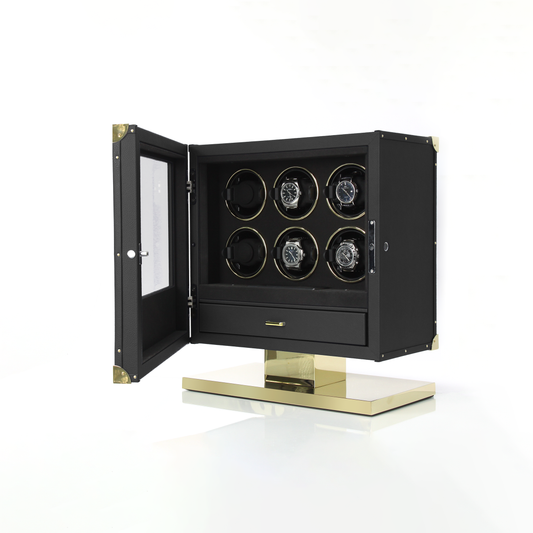Every serious collector has that one watch, the one that always seems to slip away no matter how many shows you attend or how many dealers you call. For me, that watch was the Rolex Day-Date reference 18038 with a blue vignette diamond dial.
I have admired plenty of Day-Dates in the past, solid, dependable, gold-clad icons, but this one always felt different. Was it the dial? Absolutely. That deep royal blue that fades into near-black around the edge is nothing short of mesmerizing. Add diamond markers that sparkle just enough without shouting, and you get a Rolex that somehow balances flamboyance with restraint.

Image: Amsterdam Vintage Watches
The Iconic Case and Bracelet
Of course, the foundation here is classic Day-Date DNA. Introduced in 1956, the Day-Date was the first automatic, waterproof chronometer wristwatch to display both the day and the date spelled out in full. By the 1980s, the reference 18038 carried that legacy in a 36mm 18k yellow gold Oyster case, topped with the unmistakable fluted bezel.
And then there is the President bracelet. I have handled a lot of vintage bracelets over the years, and finding one this tight and crisp after nearly four decades feels almost miraculous. The concealed Crownclasp still snaps shut with that satisfying Rolex precision. This is not just jewelry, it is engineering dressed as elegance.

Image: Amsterdam Vintage Watches
A Dial That Steals the Show
But let's be honest, you don't chase an 18038 like this just for the case or bracelet. It is the dial that makes the difference. Rolex produced many dials in the 1980s, but the vignette style is in a league of its own. The fade from vibrant blue at the center to almost midnight black at the periphery gives the watch incredible depth, almost like peering into a pool of ink under moonlight.
Now add brilliant-cut diamond hour markers, perfectly proportioned and uniformly set. It is not ostentatious, it is refined. You might be surprised how wearable it feels, especially compared to the fully diamond-paved options that can overwhelm the wrist. This dial does not scream, it sings.

Image: Amsterdam Vintage Watches
Under the Hood: Caliber 3055
Inside beats the Rolex caliber 3055, introduced in the late 1970s and used in Day-Dates throughout the decade that followed. It is an automatic movement with the 'single quickset' feature, meaning you can adjust the date independently, but the day still advances with the hours. Some collectors prefer the convenience of the double quickset, but for me, this small quirk only adds to the vintage charm.

Image: Amsterdam Vintage Watches
A Personal Triumph
What really stunned me when I first held this watch was not just the dial, it was the condition. The lugs remain sharp, the bezel still catches the light with crisp fluting, and that bracelet... oh, that bracelet. Too often these pieces show their age through stretch and wear, but this one feels like it has been waiting for me in a time capsule since 1986.
You cannot fake the feeling of a long chase ending in success. Some watches you buy. Others you earn. This Rolex Day-Date 18038 falls into the latter category for me.
And every time I catch that vignette dial shimmering in the light, I am reminded that sometimes, dreams do come true, on a 36mm canvas of gold and sapphire crystal.
YOU MAY ALSO LIKE : More Than Gold: How the Rolex Day-Date 18308 Breaks the Mold




